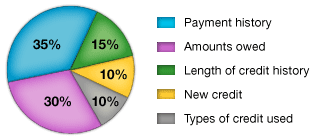Although it can be a little hard to understand, knowing what goes into determining a credit score can be very helpful!

Understanding a Credit Report and what goes into making up your Credit Score is very important! Unfortunately, neither are very easy to do.
Basically there are 5 factors that are used to determine your credit score:

I have used and highly recommend that you check out the free information available from MyFICO.
FICO stands for the Fair Isaacs Company and was one of the first company to set up a standardized credit scoring system way back in the '70's.
Since then, the top 3 Major Credit Bureaus (Experian, Equifax and TransUnion) use one a type of credit scoring system based after the FICO model. You may have seen names such as:
- Equifax BEACON Score
- Experian CE Credit Score
- FICO Score
- TransUnion TransRisk Score
- Vantage Score
There are others as well, but these seem to be the majority.
Before I get into some of the details, it is VERY IMPORTANT that you understand and keep reminding yourself of the basic concept of what or how credit bureaus come up with a "credit score" for you.
A lender wants to know how likely it is that you will repay the debt that they are considering giving you. Yes, sounds simple, but basically, that's what this is all about.
OK, so what goes into determine a "basic" credit score?
1. Your Payment History
This is one of the most important factors used in determining your credit score. According to FICO, it counts for 35% of your score.
If you have a couple or even a few late payments, that is not necessarily something that will dramatically lower your credit score.
However, if you have delinquent accounts, accounts that have been turned over to a collection agency, a bankruptcy, judgments, repossessions and/or foreclosures, then your credit score will definitely be negatively impacted.
If you have several accounts that are showing late payments of 90 days or more, that's not good.But, if most of your your accounts show a great payment record and only one or maybe two were a little late, that is not going to be as bad.
The good news is that as you go forward and demonstrate that you make your payments on time, pay your accounts in ful, l or even negotiate a settlement for less than you owe, your scores will start to improve!
2.The AMOUNT OF DEBT you are using.
This makes up 30% of your score, and here's why:
Let's say that you have been issued 5 different credit accounts, such as credit cards, store cards and an installment loan for your car.
The total amount of available credit on all of these accounts totals $50,000. Your car loan is for $30,000 and you have charged up an additional $10,000 on the other sources of credit. Let's see.....
You had $50,000 of available credit and are using $40,000 of it, so you are using 80% of the available credit!
To a lender, that seems like a very high (what I call) "CREDIT USE RATIO!"
There is no standard Credit Use Ration number, but most agree that keeping your use of available credit below 40% - 50% makes you a better CREDIT RISK than someone who just keeps charging and charging and charging!
HERE ARE A COUPLE OF IMPORTANT TIPS!!!!
- Based on the Credit Use Ratio guideline, DO NOT CLOSE accounts that you have paid off! That actually raises your ratio!
- Don't open lots of new credit accounts to try and lower your Credit Use Ratio.
The third most important factor in determining your credit score is:
3. The Length of Your Credit History
If you are just starting out applying for credit, then it may take you a while to establish a high credit score.
Of course, if you keep in mind that the whole purpose of a credit score is to give a lender some kind of a guideline of how likely it is that you will repay the debt, then this will make sense.
Having said that, DON'T GO OUT AND SIGN UP FOR A DOZEN CREDIT CARDS just to start building your credit history! If you do that, you will demonstrate that you are not a very reliable credit risk to a lender.
4. New Credit
DO NOT MAKE THE MISTAKE OF OPENING NEW ACCOUNTS HOPING TO IMPROVE YOUR CREDIT SCORES!
I remember when my daughter enrolled for college around 1994, I saw dozens of credit card companies and lenders offering FREE GIFTS for applying for credit!
I knew this was very dangerous and many, many young college students racked up hundreds if not thousands of dollars of credit card debt!
Fortunately, this has slowed down somewhat with the passage of the Credit Card Act in 2009. One of the provisions of the act bans approvals to anyone that is under 21 years of age unless they have an adult co-signer or if they can demonstrate that they have enough income to make their payments!
I believe that the Credit Card Industry has to carry much of the blame for much of the estimated TRILLIONS OF DOLLARS of credit card debt carried by Americans by making credit so easy to get!
If you don't think we (as indiviuals and as a country) are in serious trouble, the you need to check out a great article written by Tim Chen from NerdWallet .
Look at some of his summaries:
U.S. household consumer debt profile:
- Average credit card debt: $15,863
- Average mortgage debt: $156,584
- Average student loan debt: $33,090
In total, American consumers owe:
- $11.86 trillion in debt
- An increase of 1.9% from last year
- $901. billion in credit card debt
- $8.17 trillion in mortgages
- $1.21 trillion in student loans
- An increase of 8.5% from last year
Finally, the final factor used to determine your credit score is...
5. The Various Types of Credit You Have
Although this makes up only 10% of your credit score "weight", it is important to the credit card bureaus that you have and used various types of creidt, such as:
- Credit Cards
- Store Cards
- Personal Bank Loan from a bank or credit union
- Mortgages
- Auto Loans, etc.
Again, just because you have one of each WILL NOT necessarily increase your credit score, but it will provide more information on your credit report and help a lender determine your credit worthiness.
BOTTOM LINE....
Of all of the factors used to determine your credit score, it is obvious that your PAYMENT HISTORY and the TOTAL AMOUNT OF DEBT YOU ARE CARRYING are the most important.
If you have gotten into trouble and are having a difficult time making or keeping up with your payments, it may be time to seek help.
Photo Credits:






